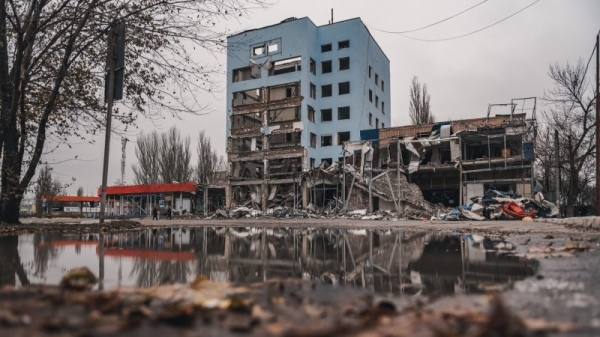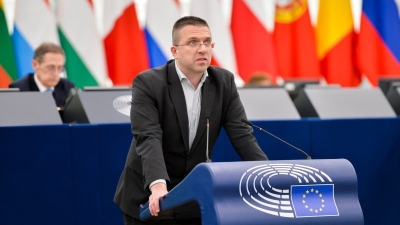How to rebuild Ukraine? A few remarks before the G7 Summit

As the G7 Summit prepares to discuss Ukraine’s reconstruction, it is crucial to approach the task with European integration in mind, prioritising Ukraine’s structural independence from its aggressor and transitioning to sustainable, carbon-neutral energy sources, writes Marcin Korolec.
On 30th March 2023, the New York Times published a photograph and article titled “Ukraine goes dark. Images from space drive home the nation’s anguish.” The black shape on the map reflecting the borders of Ukraine shows the Ukrainian society’s suffering and the scale of destruction of energy infrastructure in the country.
It is in these conditions that Ukraine has just survived the most gruelling winter in its history since World War II. We all dream and hope that the war ends as soon as possible.
Ukrainian society deserves the help of the rest of the free world in rebuilding the country, its economy and its infrastructure.
Given that the reconstruction of Ukraine is one of the topics of the G7 Summit in Hiroshima between 19 and 21 May, I would like to offer some remarks on how to manage this process.
Ukraine should be rebuilt with European integration in mind, without any additional obstacles that could hamper this process in the future.
‘Build back better’ and prospects for Ukraine’s membership in the EU
The reconstruction of Ukraine should follow the Build Back Better principle. First of all, the rebuilding process should be oriented towards ensuring Ukraine’s structural independence from its aggressor.
We need to help free Ukraine from fossil fuel energies the main financing source of the entire Russian aggression machine, time and again used by Russia to exert political pressure.
Ukraine’s houses, economy and industry should rely on their own carbon-neutral renewable sources of energy or nuclear energy sources.
Constructing a new energy system for Ukraine is an investment, organisational, political and social challenge. Ensuring a housing sector free from fossil fuels is a huge task.
Electrifying road transport in Europe’s second-largest country presents a similar challenge. And phasing out fossil fuels in an economy that used to rely on heavy industry would have been unthinkable before the Russian aggression.
Examples of green recovery exist already. With support from several European countries, Ecoclub NGO is installing solar panels on hospital roofs providing alternative and affordable energy sources.
These solutions must be promoted, encouraged and multiplied.
The donors need to coordinate
Today, as we prepare for rebuilding Ukraine and Kyiv is negotiating accession to the EU, it is clear that Ukraine’s future must be designed to ensure that these two great processes complement and drive each other.
It is safe to assume that the main actors financing the reconstruction of Ukraine will be the European Union, the USA and probably other OECD countries, such as Japan, Canada, and Australia.
Already today, the donors providing financial support to Ukraine who will still be around during reconstruction include international financial institutions, most notably the World Bank and the International Monetary Fund.
This diverse group of entities, many from outside the EU, engenders the need to coordinate action to avoid financing projects that would be problematic in the context of Ukraine’s future accession to the EU.
It is clear that when rebuilding Ukrainian homes destroyed by the war, we cannot subsidise coal-based heating.
Yet, to what extent rebuilt homes and estates should use gas-based heating solutions is a more complicated question. Ukraine must be rebuilt as soon as possible, this is obvious.
At the same time, as part of the EU accession procedure, Ukraine will have to accept the acquis communautaire, such as the Fit for 55 package and the obligation to reduce emissions by 55% until 2030.
Similar questions multiply when it comes to the transport or energy sectors. Therefore, we need to strengthen the existing Multi-agency Donor Coordination Platform.
It could be composed of, not only representatives of Ukraine, financial institutions, and EU Member States but also of Representatives of the European Parliament think tanks, and NGOs.
An independent oversight council, which will include civil society, to monitor the platform’s progress could be created.
It will ensure accountability and transparency and increase public trust in the management of the green reconstruction process.
Ukraine needs to deliver spatial planning fit for 21st-century challenges
Rebuilding Ukraine can serve as an opportunity to draw up new spatial planning concepts fit for the 21st century.
Parts of the urban fabric, infrastructure and industrial plants are so destroyed that reconstructing them may not make economic sense.
In such cases, it is worth using the rebuilding process to design new urban and spatial planning concepts. Adapting cities to rapidly changing climate conditions or 15-minute cities are oft-discussed subjects, particularly in Europe.
These and similar concepts should be taken into account to avoid repeating development errors committed several times in Europe and the USA because of the turbulent and uncoordinated development of urban centres.
I am positive that in this regard, too, Ukraine may count on the support of experts from the entire free world.



